The Will of Arthur Flabbington review
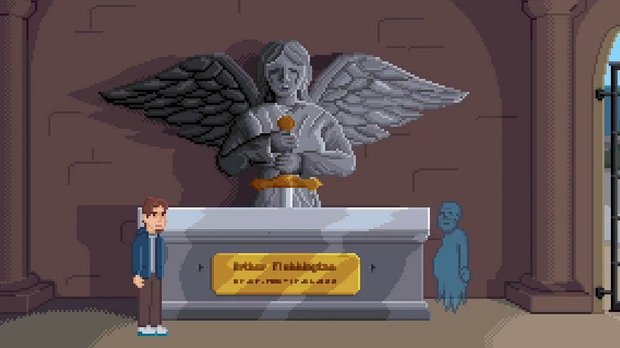
- 0 Comments
Plenty of nostalgic spirit in this funny, unapologetically retro indie adventure
With the release of their throwback point-and-click debut The Will of Arthur Flabbington, developer Gugames have given audiences an adventure very much in line with the genre’s golden age, both the (mostly) good and (occasionally) questionable. The game is unapologetically old school, dividing its time between a barrage of puzzles, ranging from clever nail-biters to the odd frustratingly unintuitive ones that demand trial and error rather than pure creative thinking. What makes the game so enjoyable even in the hair-pulling moments, however, is just how genuinely comedic it is throughout, a feat many have tried but few have been able to pull off quite this successfully – with the caveat that you may have to reach for a walkthrough from time to time, just like the olden days.
Arthur Flabbington is dead. He may be the game’s eponymous character, but instead you take on the role of the recently deceased’s nephew Jack, who is not particularly pleased to find that his dearest uncle decided to leave him out of his will. With a mysterious treasure on the line as part of the inheritance, the stage is set for a tongue-in-cheek quest that sees Jack engaging in some morally dubious spirit summoning in order to secure his uncle’s purported wealth against his express wishes. While attempting to conjure Arthur’s spirit from the afterlife – in the process cutting, as is customary for oh-so-many bumbling adventure game protagonists, several inventory-related corners – the ritual goes awry and summons the wrong spirit. Arthur Feldberg is decidedly not Jack’s uncle but is now nonetheless tethered to him until the treasure is found. The two set out to track down Ada and John, Uncle Arthur’s long-time friends and the actual beneficiaries of his will, to convince them to part with their shares of the fortune.
With the stage thusly set, the game is broken down into three chapters: an intro that takes care of any spirit-inducing housekeeping, a meaty middle section that sees the pair run all over town to accomplish their quest, and a final resolution to the treasure hunt. The second act, being by far the longest, provides the majority of the game’s inventory-based puzzles; while the first and third chapters also feature puzzles, they are each contained to a single multi-screen location, whereas chapter two spans the whole of Jack and other-Arthur’s quaint town. As such, we see the pair travel to numerous locations, whether paying a visit to the local cemetery or the statuesque water fountain in the town square, making a stop at an all-you-can-shovel-off-the-conveyor-belt Italian café, or trying to convince a pair of stoner metalheads moshing out at a several-story tenement that they’re righteous and gnarly enough to be given the time of day. It’s a healthy number of settings without being overwhelming, as only a few are initially available and others join the mix as Jack and other-Arthur organically discover them.
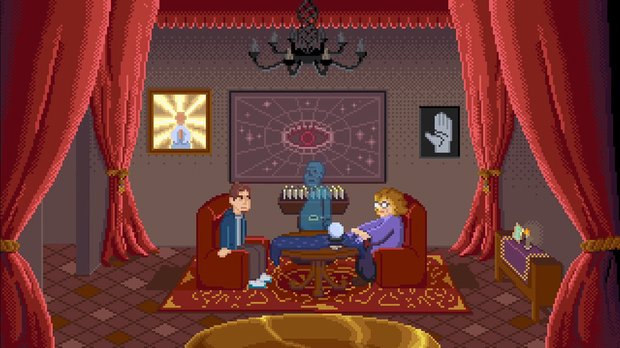
Gameplay will be intimately familiar to any who’ve even casually dabbled in the adventure genre, with pointing and clicking to navigate and examine objects of interest, and dialogue trees to exhaust during conversation. It’s all perfectly standard Adventure Game Studio stuff, which means it also looks quite similar to scores of other indie pixel art games. The graphics are perfectly acceptable, but neither the level of detail inherent in the world nor the occasional bits of animation are particularly noteworthy.
Thankfully, most of the game’s puzzling is far more of a highlight. The Will of Arthur Flabbington joins the list of games that quickly inundate you with potential roadblocks to chip away at, so that there is always a generous helping of brain-benders to ponder. Few of them feature obvious, quick solutions, so even when you have to step away from a game session with a laundry list of issues that still require resolving, it’s quite fun to spend time away mentally picking at them from every angle, hopefully coming up with three or four potential things to try out the next time you return.
There are, however, one or two times when the developer takes things too far, and they have the potential to somewhat undermine enjoyment. Take, for instance, the case of the automatic pizza machine and the annoying lone diner who will only leave when presented with a specially topped pie. While it’s an easy thing to work out the general idea of what you’re meant to do, the puzzle features a dastardly number of variables you can only guess at, with numerous toppings to choose from and no limit on how many or how few to actually add, leading to a frustrating excess of possibilities. Sure, a walkthrough will make short work of these rare cases, but it’s a shame they happen at all when 95% of the puzzles feel so satisfying to conquer yourself.

One facet that contributes to lots of possible interactions and potential paths forward is the game’s dual-protagonist mechanic. Once the spectral other-Arthur has been summoned, you can switch between him and Jack at will, with both proving vital to progress. Of course, being deceased affords a ghost some benefits (and drawbacks) a living human doesn’t have. For one, other-Arthur’s ethereal form is able to pass through locked doors, and later in the game he can even possess and control a few of the game’s NPCs. On the flipside, being incorporeal means other-Arthur can’t interact with physical objects or keep an inventory, and other characters can’t see or hear him the way Jack can, so he’s of no use in a conversation.
The whole system provides an extra layer of problem-solving flexibility and an additional wrinkle to consider when thinking outside the box to come up with a creative solution to a problem. If it starts to feel overwhelming, other-Arthur also acts as a quasi hint system, as having Jack talk to him opens up a list of current objectives your ghostly companion can comment on. However, these “hints” are so general as to rarely be much help, really being more of a summation of the scores of current roadblocks that must be unraveled, rather than any direct suggestions on what to actually do.
Not only is the two-character dynamic used to spice up gameplay, it also pays lots of comedic dividends. Jack and other-Arthur, as you can easily imagine, aren’t overly fond of each other from the outset, one sore for having his perceived ticket to wealth and riches snatched out of his grasp, the other grumpy for being unceremoniously ripped away from his cozy afterlife and pressed into service to a complete stranger. There’s a decidedly Odd Couple vibe, with the two sniping and digging at each other with genuinely humorous banter (though still light-hearted enough to allow for an actual relationship arc to play out between them). The supporting cast, like the sharp-tongued and feisty spirit medium, only add to the general goofiness and different funny bones are catered to – even toilet humor isn’t shortchanged, with not one but two separate instances of poop jokes splattered into the adventure.
As funny as the writing is, a certain amount of praise must also be heaped on the main characters’ voice actors, who ply their craft with downright hilarious deliveries. Other-Arthur is deliciously ornery, in all the best ways, while I could’ve sworn that Jack was being performed by Richard Ayoade (The IT Crowd’s instantly recognizable Moss) – turns out he isn’t, but all credit to the voice actor for perfectly aping his trademark style. The supporting voice cast unfortunately doesn’t offer the same level of quality, though most are decent, with only a few that totally miss the mark. Although perhaps some of that was intentional, as even the game’s designer occupies a cameo role, with a deliberately over-the-top performance. The music fits the game’s jolly tone well, perfectly imitating 90s adventure game soundtracks and conjuring up recollections of the MIDI days of old.
Final Verdict
For those who are steeped in the adventure game classics, The Will of Arthur Flabbington offers a lot to like. It successfully captures the feel and ambiance of any number of older point-and-click genre favorites, while managing at times to be laugh-out-loud funny and certainly devilishly tricky. Its roughly eight-to-ten-hour duration is substantial without overstaying its welcome, though without the occasional glance at a guide, this runtime could easily stretch to a dozen hours or so due to a couple of needlessly frustrating puzzles. At the end of the day, however, the good times far outweigh the bad, resulting in a tasty piece of modern retro-gaming comfort food that makes for a delightful palate cleanser in between the more serious dishes.
Hot take
Other than the odd puzzle frustration, The Will of Arthur Flabbington offers plenty of nostalgia, laughs and a gauntlet of inventory-based brainteasers that is sure to stretch your creative thinking when glued to your screen and keep you thoughtfully pondering when away from it.
Pros
- Genuinely amusing script and fun dynamic between the two leads
- Many well-designed puzzles to wrack your brain over
- Strong voice acting for the main characters
- Interesting dual-player mechanics expand possibilities
Cons
- A couple of puzzles involve excessive trial and error
- Supporting voice cast is noticeably less memorable
Pascal played The Will of Arthur Flabbington on PC using a review code provided by the game's publisher.




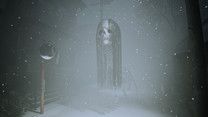

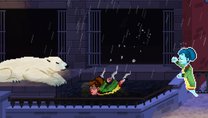

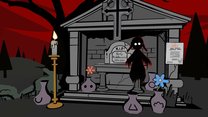
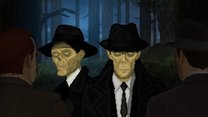
0 Comments
Want to join the discussion? Leave a comment as guest, sign in or register in our forums.
Leave a comment